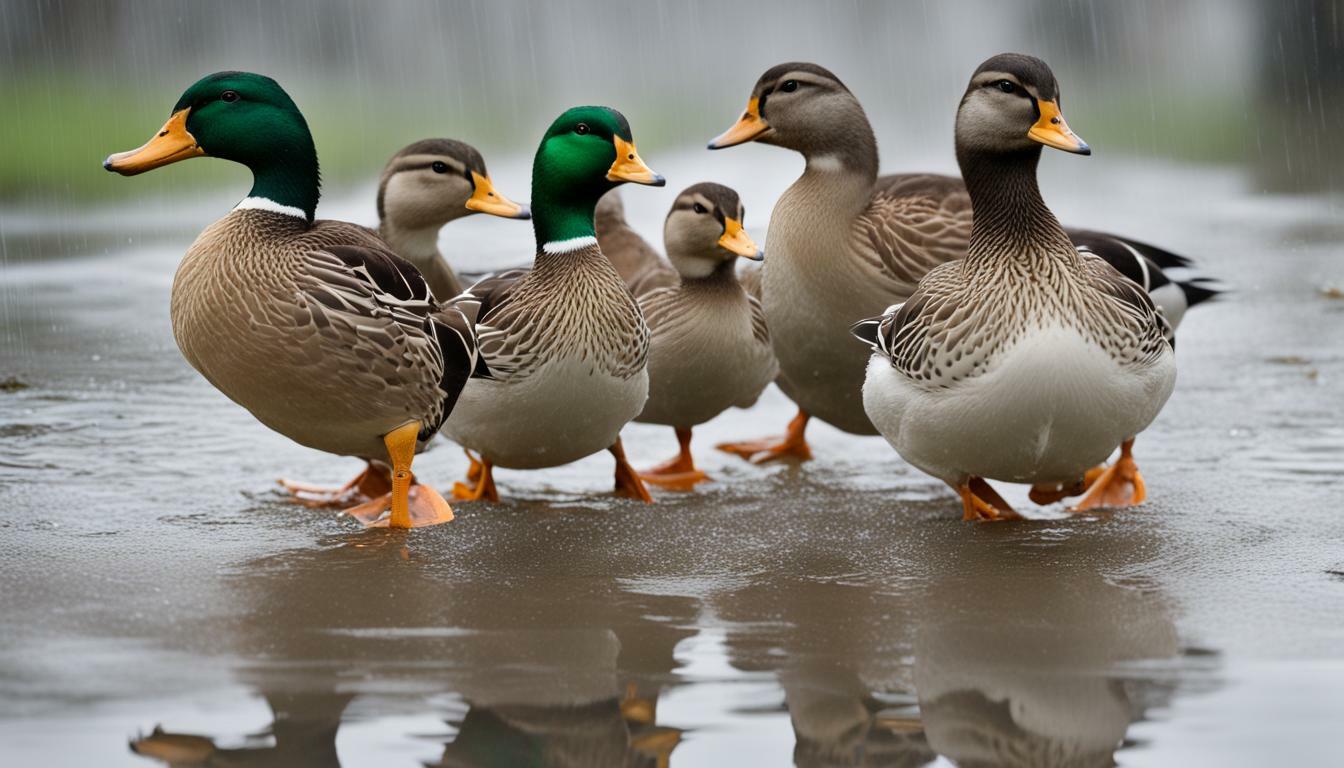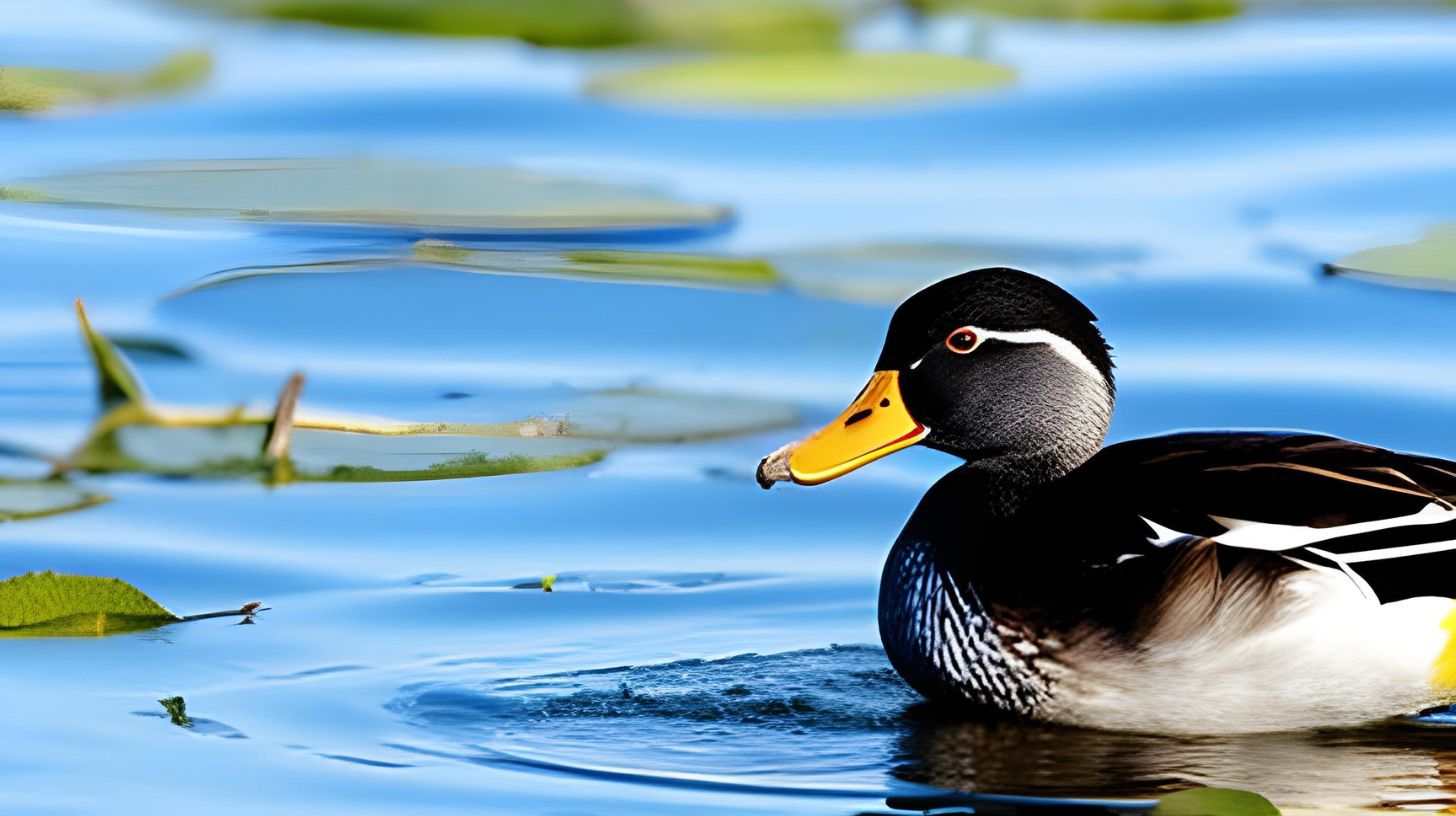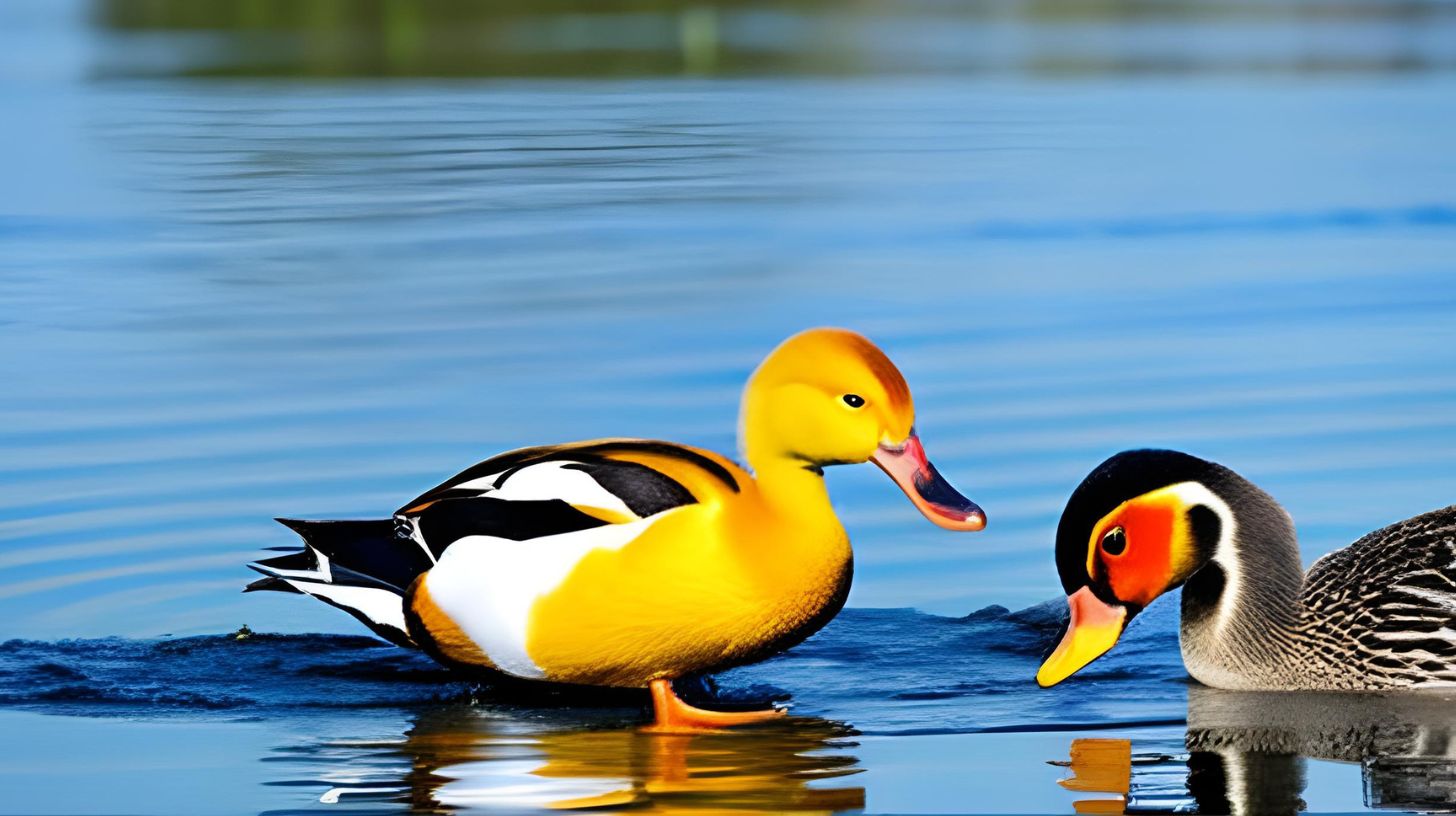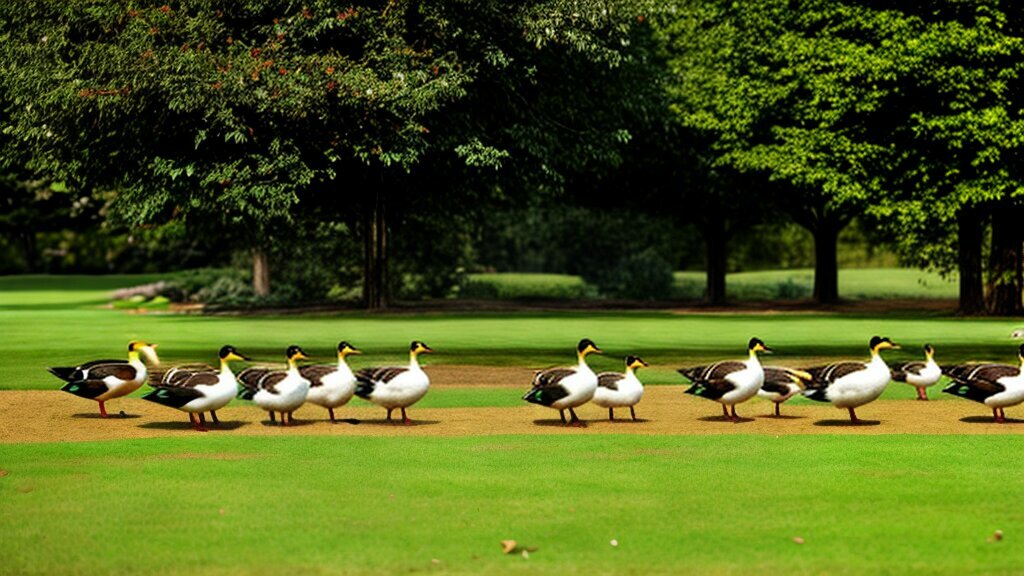Do Ducks Like Rain? Uncovering the Truth

Table of content:
Ducks are a common sight around ponds, lakes, and other bodies of water. Their waterproof feathers seem designed to shed rain and moisture. But do ducks actually like being out in the rain? How does wet weather impact these aquatic birds? Let’s take a closer look at how rain affects ducks.
Do Ducks Mind Getting Wet in The Rain?
Ducks have a complex relationship with rainfall. Their feathers readily repel water thanks to special oil that birds spread from their preen gland. This waxy coating causes moisture to bead up and roll off the plumage. So a light rain shower doesn’t bother most duck species.
However, ducks clearly don’t enjoy getting drenched in heavy downpours. They will seek shelter in thicket, hides, or other covered areas during intense precipitation. Given the choice, ducks would rather remain dry than weather a severe rainstorm.
Duck preferences vary based on the season too. During breeding times, males must keep their decorative feathers in prime condition to attract mates. Heavy rain can cause feather damage and soil courting displays, so drakes are more motivated to take cover.
Brooding hens with ducklings are also averse to rain. Ducklings lack hardy waterproof feathers, so mothers shelter their young when possible. Otherwise chicks can become waterlogged and chill, risking hypothermia or drowning.
So while ducks are well equipped for moderate wet conditions, most species avoid pouring rain when they can. Their behaviors point to a distinct preference for staying dry over unnecessary exposure.
Do Ducks Need Shelter From The Rain?
As discussed above, ducks will seek shelter in heavy rain when available. But what kind of refuge do they require? And how necessary is it really?
Species that nest in tree cavities or nesting boxes, like wood ducks, buffleheads, and common goldeneyes, have built-in protection from precipitation. But dabbling ducks often build open platform nests on the ground or in marsh vegetation. These exposed nests leave eggs and newly hatched ducklings vulnerable.
Brooding hens will cover their eggs and recently hatched chicks as best they can. But extended cold rains can lead to embryo deaths and duckling fatalities if no other cover is available.
During the rest of the year, most healthy adult ducks tolerate rainfall without serious harm. Their reinforced feather structure shakes off moisture from light to moderate showers.
However, long storms or consecutive days of heavy rain take a toll. Plumage becomes waterlogged, which strips away insulating air pockets. This leaves ducks more vulnerable to hypothermia. Seeking a sheltered area gives them a chance to preen and fluff up their feathers to restore insulation.
Cover from heavy wind and precipitation also helps ducks conserve energy. Remaining out in rainstorms forces ducks to expend more calories staying warm. This makes finding shelter beneficial even if not 100% necessary for short showers.
Do Duck Feathers Get Waterlogged in Heavy Rain?
The feather structure of ducks does an impressive job shedding water under normal conditions. Feathers interlock to form a barrier that rain rolls off of. But heavy or extended wet conditions can overwhelm natural water resistance.
Feathers are made up of a central shaft with branched barbs extending out from either side. Tiny barbules with hooklets then create a unified veined surface. This forms a smooth coat that is naturally hydrophobic.
Preen oil rubbed onto feathers from the uropygial gland near the tail reinforces this water resistance. So light showers cause little issue. The barbs and barbules maintain air pockets for insulation too.
But in intense downpours or consecutive days of rain, the feather structure can become compromised. The hooklets that connect barbules weaken and separate. This allows water to penetrate into the veined layers.
Once saturated, the feathers mat down and lose trapped air pockets. The result is a wet, heavy coat with greatly reduced insulation capacity. Prolonged exposure can lead to hypothermia as body heat escapes.
The good news is that most ducks can restore their feather integrity when given a chance to preen and dry out. But during extended storms, waterlogged plumage poses real risks that ducks clearly try to avoid.
Do Ducks Enjoy Swimming in The Rain?
Many people picture ducks happily paddling around in the rain without a care. But studies of duck behavior contradict this idea.
While waterfowl species certainly don’t mind getting wet, most will avoid swimming in heavy rain when possible. There are a few reasons for this:
- Difficulty seeing – Just like people, ducks have a hard time seeing well during downpours. Vision is already challenged underwater, so rainy conditions further increase blindness. This makes swimming and foraging more dangerous.
- Energy loss – Trying to stay warm while swimming in cold rains requires extra energy expenditure. Ducks conserve calories by seeking shelter from precipitation when feasible.
- Plumage damage – As discussed above, heavy exposure from extended rain can degrade feather structure over time. Ducks appear to intuitively know that unnecessary soaking while swimming isn’t ideal.
- Thermal regulation – Water draws away body heat much faster than air. This makes swimming on rainy days a cold and energetically costly affair best avoided.
- Slippery banks – Getting in and out of ponds is trickier when surfaces are slick from rain. Muddy footing can also soil plumage and ruin feather oils.
There are always exceptions, of course. Some species may bathe and preen more after rainfall to re-oil their coat. Male dabbling ducks also continue lively courtship displays even in light rains to impress females.
But in general, ducks appear to intentionally limit swimming when heavy rains strike. Their actions point to a preference for waiting out showers compared to unnecessary paddling.
Do Ducks Sleep During Rainy Days?
Ducks follow natural circadian rhythms like most animals. But rainy weather appears to modify their typical sleeping patterns.
Research shows ducks spend less time sleeping during sustained downpours. There are a few explanations for these rain-related disruptions:
- Difficulty finding shelter – With limited cozy, dry refuge available, getting quality rest is harder in wet weather.
- Increased vigilance – Ducks rely more on their eyes when vision is impaired by rain. This may interfere with the ability to nap soundly.
- Energy conservation – Lowering energy use by sleeping less may help compensate for heat loss from wet conditions.
- Feather maintenance – More frequent preening to maintain feather integrity and warmth leaves less time for sleeping.
Dabbling ducks especially seem prone to rain-related sleep deprivation. Their open ground nesting makes sheltering hatchlings difficult. Constant vigilance against predators is required, along with more brooding time to keep eggs warm if mom lacks cover.
The birds make up sleep when conditions improve, just like humans. But until the rain passes, disrupted rest is the norm. Ducks appear chronically tired on consecutive stormy days.
Interestingly, a few ducks follow alternative sleep strategies during rain. Male mallards reportedly sleep less but more deeply. Teals increase sleep only immediately after rainfall ceases. Ducks are remarkably adaptive when responding to wet conditions.
Do Ducks Ever Get Too Cold When it Rains?
Thanks to superb insulation from their feather structure, ducks are well equipped to withstand cold wetness. But hypothermia is still a risk in severe conditions.
As discussed above, heavy rain can eventually waterlog duck plumage. This leaves them prone to dangerous chilling if exposed for too long. Young ducklings lack hardy feather coats and are especially high risk.
Prolonged storms also lower temperatures which requires extra energy expenditure to stay warm. Distance migration can be particularly problematic if ducks encounter freezing rain. Stopping to rest and dry out may be essential for survival.
Health impacts cold tolerance too. Oil secreting uropygial glands can become blocked, limiting a duck’s ability to waterproof. Age or malnutrition may also reduce natural insulation. Any compromised duck is more vulnerable to rain-induced chilling.
Thankfully most healthy ducks can handle typical rainfall without issue. But during weather extremes, finding cover and companionship to conserve warmth becomes critical. In such conditions ducks do appear to actively avoid the dangers of cold rain whenever possible.
Do Ducks Migrate Away When Rainy Season Starts?
Contrary to belief, rainy seasons alone do not trigger duck migrations. However, heavy rainfall does influence migratory timing and pathways for some species.
These responses to storms are driven chiefly by food limitations. For example, prairie pothole ducks must time northern journeys to align with seasonal wetlands thawing. Early spring deluges can delay nesting and shorten enjoyable breeding grounds duration.
Meanwhile, excess summer rains flood marsh areas used by breeding ducks. This reduces nourishment which can hasten southern departures. Rains also refill migration stopover spots, allowing alternative routes.
Other factors like barometric pressure changes influence migration too. But sustaining adequate nutrition amidst rain-related habitat shifts seems the primary driver.
Most ducks don’t make large directional shifts solely due to rain quantity though. Any relocations are more gradual and food motivated. Their hearty waterproofing allows most species to endure seasonal precipitation at breeding and wintering grounds.
However, ducks may temporarily relocate during major rainfalls. Traveling to refuel somewhere drier before returning is not uncommon. This minimizes energy expenditure and avoids plumage damage from storms.
So while rainy periods don’t directly cue migrations, they do impact duck movements. Their ability to adapt helps waterfowl thrive across diverse wetland environments.
Conclusion
Ducks have an intricate relationship with rainfall that goes beyond simple enjoyment. Their waterproof feathers handle light showers well. But extensive wet conditions pose risks ranging from hypothermia to impaired vision and nutrition deficits.
Given the choice, most ducks avoid unnecessary rain exposure by finding cover, decreasing time spent swimming and foraging, and modifying sleep patterns. Healthy adults tolerate normal rainfall without issue. But ducks lack a biological drive to remain out in heavy rains for extended periods.
Duck behaviors point to a distinct aversion for unnecessary soaking. While well-adapted to wetness, periods of persistent heavy rainfall are something to be waited out rather than embraced. So next time a downpour strikes, imagine ducks hunkering down under thickets rather than happily splashing about!
Welcome. I’m Adreena Shanum, the proud owner of this website, and I am incredibly passionate about animals, especially poultry. I founded adreenapets.com as a labor of love, stemming from my desire to share my knowledge and experiences with poultry enthusiasts worldwide.




